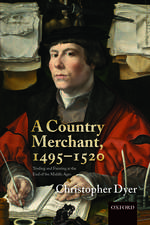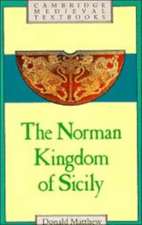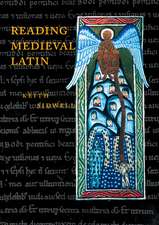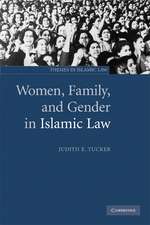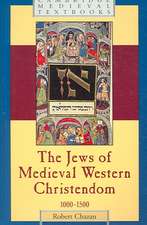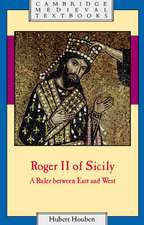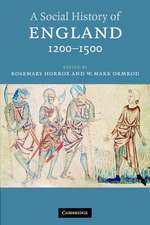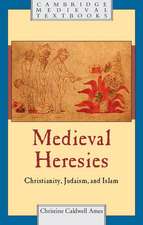Germany in the High Middle Ages: c.1050–1200: Cambridge Medieval Textbooks
Autor Horst Fuhrmann Traducere de Timothy Reuteren Limba Engleză Paperback – 8 oct 1986
Din seria Cambridge Medieval Textbooks
-
 Preț: 204.78 lei
Preț: 204.78 lei -
 Preț: 209.74 lei
Preț: 209.74 lei -
 Preț: 238.60 lei
Preț: 238.60 lei -
 Preț: 392.66 lei
Preț: 392.66 lei -
 Preț: 226.53 lei
Preț: 226.53 lei -
 Preț: 281.09 lei
Preț: 281.09 lei -
 Preț: 171.24 lei
Preț: 171.24 lei -
 Preț: 234.23 lei
Preț: 234.23 lei -
 Preț: 398.83 lei
Preț: 398.83 lei - 11%
 Preț: 554.35 lei
Preț: 554.35 lei -
 Preț: 285.27 lei
Preț: 285.27 lei - 11%
 Preț: 574.33 lei
Preț: 574.33 lei -
 Preț: 327.41 lei
Preț: 327.41 lei -
 Preț: 413.31 lei
Preț: 413.31 lei -
 Preț: 267.18 lei
Preț: 267.18 lei -
 Preț: 292.19 lei
Preț: 292.19 lei -
 Preț: 383.37 lei
Preț: 383.37 lei -
 Preț: 436.45 lei
Preț: 436.45 lei -
 Preț: 319.74 lei
Preț: 319.74 lei -
 Preț: 322.62 lei
Preț: 322.62 lei -
 Preț: 365.34 lei
Preț: 365.34 lei -
 Preț: 289.78 lei
Preț: 289.78 lei -
 Preț: 439.33 lei
Preț: 439.33 lei -
 Preț: 290.28 lei
Preț: 290.28 lei -
 Preț: 320.50 lei
Preț: 320.50 lei -
 Preț: 441.67 lei
Preț: 441.67 lei - 11%
 Preț: 457.95 lei
Preț: 457.95 lei -
 Preț: 363.65 lei
Preț: 363.65 lei -
 Preț: 287.39 lei
Preț: 287.39 lei - 14%
 Preț: 756.74 lei
Preț: 756.74 lei - 14%
 Preț: 885.74 lei
Preț: 885.74 lei
Preț: 375.21 lei
Nou
Puncte Express: 563
Preț estimativ în valută:
71.79€ • 74.96$ • 59.42£
71.79€ • 74.96$ • 59.42£
Carte tipărită la comandă
Livrare economică 04-18 aprilie
Preluare comenzi: 021 569.72.76
Specificații
ISBN-13: 9780521319805
ISBN-10: 0521319803
Pagini: 220
Dimensiuni: 140 x 217 x 14 mm
Greutate: 0.3 kg
Editura: Cambridge University Press
Colecția Cambridge University Press
Seria Cambridge Medieval Textbooks
Locul publicării:Cambridge, United Kingdom
ISBN-10: 0521319803
Pagini: 220
Dimensiuni: 140 x 217 x 14 mm
Greutate: 0.3 kg
Editura: Cambridge University Press
Colecția Cambridge University Press
Seria Cambridge Medieval Textbooks
Locul publicării:Cambridge, United Kingdom
Cuprins
Part I. German history in the High Middle Ages - Concepts, Explanations, Facts: 1. The three 'essentials' of history - space, time, and man; 2. Germany in the Europe of the high Middle Ages; Part II. 'Progress and Promise': The German Empire in the Mid Eleventh Century: 3. Social stratification and the structure of government in the Ottonian and Salian period; 4. Rex et sacerdos - the priestly kingship of Henry III (1039–56); 5. Strengths and weaknesses of Salian kingship; 6. Henry III as Roman patricius and the German popes; 7. The beginnings and aims of church reform; 8. The distance from the rest of Europe: France, England and the North; Part III. From Christus Domini to Antichrist: The King of Germany and the Investiture Contest: 9. The reign of Henry IV and its consequences; 10. The rise of the secular state and the priestly church; Part IV. Political Reorientation and Emergent Diversity: From Salian Imperial Church System to Staufer Kingship: 11. The results of the investiture contest; 12. 'The love of learning and the desire for God': church and spirituality in the age of Bernard of Clairvaux; 13. Lothar III: kingship without a future; 14. Conrad III: kingship without imperial glory; Part V. The Centre-Point of the German Middle Ages: Frederick Barbarossa and His Age: 15. The election of Frederick I and the policy of balance: Frederick and the Empire before the Alexandrine schism; 16. Empire and papacy in the struggle for supremacy; 17. New forms of government; 18. Henry VI and the shift in the Empire's centre of gravity; Bibliography; Index.
Recenzii
'Horst Fuhrmann gives us 150 stormy years in 180 pages. his narrative is economical and lucid, though he opens with a relatively leisurely chapter on space, time and man in the Middle Ages. This masterly survey of 'medical anthropology', with its evocation of the harsh environment and alien thought-world of the period, is followed by a deft sketch of the transformation of Western Europe into something recognizably 'modern' by the year 1200.' The Times Literary Supplement
'This concise, vigorous, well-translated delineation of a short span, only a century and a half, of germany's medieval experience has the great merit of setting the events within the European context. The author succeeds in showing that Germany was not behind hand in the economic, cultural and religious advances usually attributed to french and italian society as pioneers in that age … The book is published in hardcover and paperback, and will establish itself, by its great verve and readability, as the standard short sccount in English for some years.' History
'This concise, vigorous, well-translated delineation of a short span, only a century and a half, of germany's medieval experience has the great merit of setting the events within the European context. The author succeeds in showing that Germany was not behind hand in the economic, cultural and religious advances usually attributed to french and italian society as pioneers in that age … The book is published in hardcover and paperback, and will establish itself, by its great verve and readability, as the standard short sccount in English for some years.' History
Descriere
Germany in the High Middle Ages opens with a wide-ranging and yet detailed description of the conditions and changes under which men lived and their attitudes of mind during the period 1050-1200. It explains how new classes emerged, universities were founded and how Germany rose and fell as a major empire.






